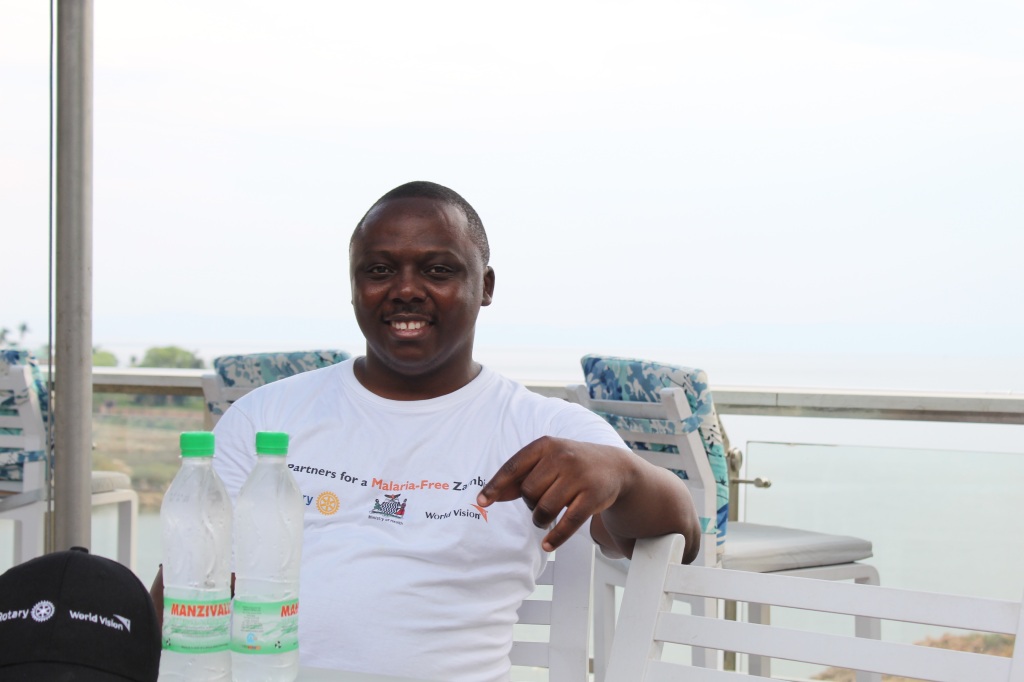
By Eric Liswaniso, member of the Rotary Club of Ndola and the Rotaract Club of Lusaka, Zambia
One of the most frustrating things about malaria is the preventable suffering it imposes on families. The death of a child or a parent, the loss of work, or economic stability can be devastating.
I lost my parents quite early, and life became very difficult for me and my siblings. Fortunately, with help from family members, I was able to complete my education and support my younger siblings through their schooling. But my experience awakened me to the misfortune of many others, for whom losing a parent leads to a lifetime of suffering. I’m now a husband and the father of a two-year-old daughter, so fighting malaria — which particularly affects children under five and pregnant women — is personal.
Four years ago, I joined the Rotaract Club of Lusaka, Zambia, to serve my community. When I moved to Ndola to do malaria prevention work, I joined the Rotary Club of Ndola. As a program manager for the organization Malaria Partners Zambia, my professional work contributes directly to ending malaria in this country. It has become my calling. We want to give our children a fair chance of survival and help them thrive by bringing health services closer to them. In my new role, I help mobilize Zambian and international Rotary members as part of the Partners for a Malaria-Free Zambia program, which in 2021 became the first member-led project to receive The Rotary Foundation’s $2 million Programs of Scale grant.
With additional funds from World Vision U.S. and the Bill & Melinda Gates Foundation, we’ll have $6 million to carry out a three-year program to recruit, train, and support 2,500 community health workers to combat malaria. They’ll test for, diagnose, and treat malaria as well as pneumonia, diarrhea, and other preventable diseases among more than 1.2 million Zambians, mostly in hard-to-reach areas.
Achieving our first milestones
More than 80% of Zambia’s population is at risk of malaria, which is spread through the bites of infected mosquitoes. It’s one of the deadliest diseases in the nation. The Partners for a Malaria-Free Zambia team aims to reduce the number of cases by 90% over time in 10 districts in the Central and Muchinga provinces. Within six months, we trained nearly all of our district health center facilitators and more than 1,300 of the new community health workers. We plan to finish training all the community workers this year and ensure that they’re fully integrated into local health systems to be most effective.
We provided the community health workers with bicycles, cellphones, laptops, uniforms, face masks, hand sanitizer, and other supplies to start their work. Instead of patients having to travel several kilometers to the nearest health center, our volunteers bring malaria tests and medicines directly to rural communities. We have already found that more cases are being quickly diagnosed and treated.
The community health workers, who are members of the communities they serve, collect data that helps us understand where more malaria and medical supplies are needed. And the district centers manage the program locally to ensure its sustainability. We’ve held orientations with more than 200 local faith, traditional, and civic leaders, so they’re part of the effort. We are also launching public awareness campaigns using radio and community programming. Our role is to support the Zambia National Malaria Elimination Centre’s countrywide strategy and strengthen the overall health system for the long term. To make sure the program is generating positive change and operating efficiently, I and my fellow project leads track and measure all aspects of our work. We need to know that the many hours and resources devoted by Rotary members and our partner organizations are truly making an impact.
Overcoming challenges
Our work hasn’t been without challenges. When COVID-19 cases peaked in Zambia, we were just three months into implementation. We had a partial lockdown, with public gatherings suspended. This slowed our training schedule and equipment deliveries to community health workers. We had to adjust our class sizes and budgets, but were able to remain on course thanks to hard work and innovation from Rotary members and our partners.
Inspiring new clubs
Rotarians and Rotaractors in Zambia’s Central, Copperbelt, Luapula, and Lusaka provinces have invested more than 2,300 hours into the effort, demonstrating our collective commitment to eliminating malaria. Members are organizing and facilitating the community health workers’ training and educating participants about Rotary’s work. We are united in our passion for service, while building new friendships and expanding our reach in our communities. Our efforts are also inspiring new clubs to form in the Central and Muchinga provinces.
Like me, people want to be part of the solution to protect their friends, families, and neighbors from malaria. It’s empowering to work with fellow Rotary members from across Zambia — and across the ocean — toward our common goal.
Learn more about Rotary’s Programs of Scale and Partners for a Malaria-Free Zambia.
About the author: Eric Liswaniso spent 10 years in public service before joining Malaria Partners Zambia, which is part of Malaria Partners International founded by Rotary members to eliminate malaria. He’s using his passion for Rotary and his experience in socioeconomic development, project management, and community engagement to raise awareness and inspire people to become advocates for a malaria-free Zambia.
https://blog.rotary.org/2022/02/02/working-toward-a-malaria-free-zambia-is-personal/
